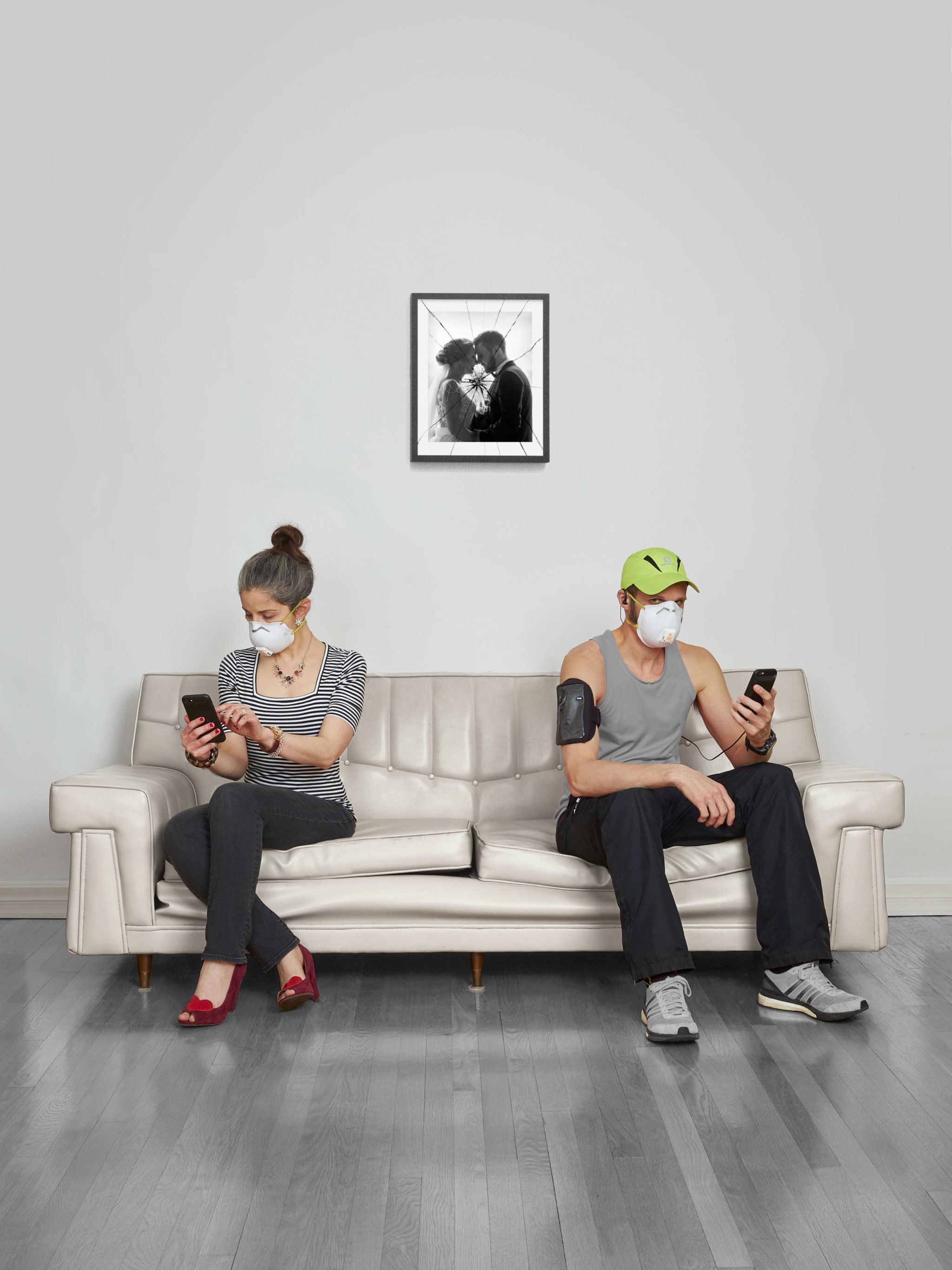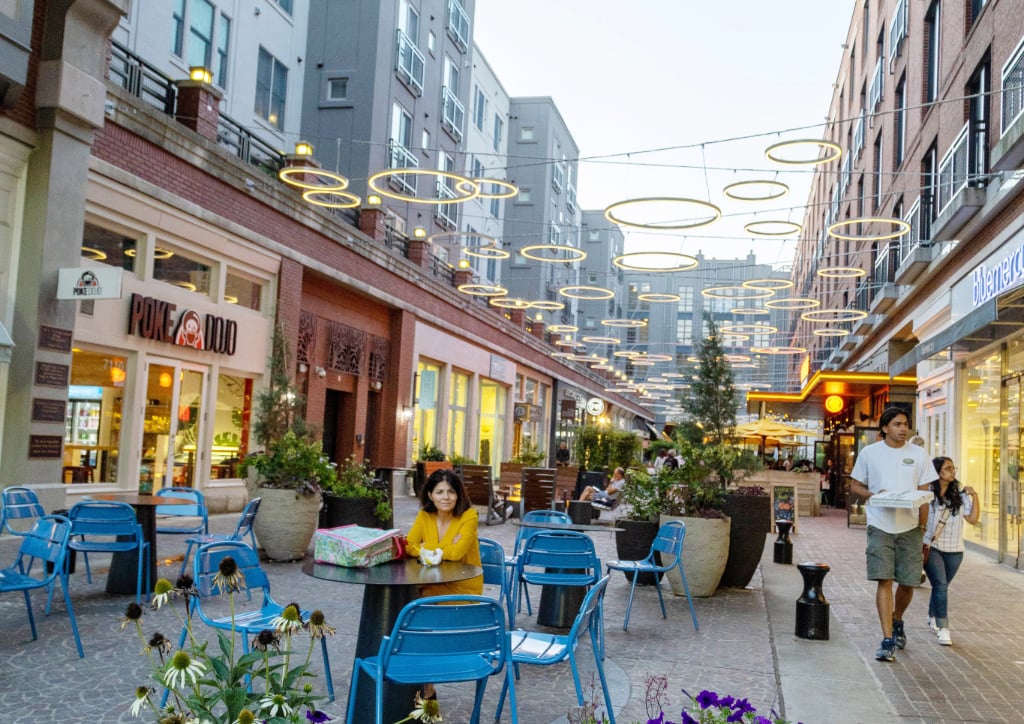One Sunday afternoon in late April, a Washington mom I’ll call Marie is parked outside a CVS in Northern Virginia. Her family thinks she’s out running errands. Which is mostly true. But she’s also here because ever since the coronavirus lockdown hit, her car has become an oasis—a private island for one where Marie can Zoom with her therapist, vent to friends, and, on this particular day, talk to me about a situation that was festering before Covid-19 and has become nearly intolerable now. Basically, all the reasons her husband is an asshole.
“I have no evidence of infidelity, although I have strong suspicions,” Marie says. “He’s a very tech-savvy type. And he just hides stuff, which makes me feel like there’s something going on.”
She thought about divorcing him over the years. Like after their first child came along—and he expected her to manage all the childcare responsibilities, never mind her full-time federal job. She also considered ending it after discovering his porn addiction. And when he suggested a threesome. But she stayed, muscling through for the sake of their young kids.
By this spring, though, Marie had decided she was finally done. She kicked him out of their bedroom and banished him to the basement. But her timing couldn’t have been worse. This was early March, not even two weeks before quarantine commenced.
So instead of calling a lawyer, making a plan, telling their children, Marie and her husband have been trapped under the same roof from that day forward, in sickness and in health, and presumably until the end of a pandemic lets them part.
Before, she’d hear the door latch behind her husband by 6 am most weekdays, and he often wouldn’t come home until after the kids’ bedtime. “It was a sigh of relief” to spend so much time apart every day. Now, she says, “my energy is sapped, because he’s just there.”
Spouses like Marie have been hiding out in their cars (and backyards and bathrooms) all over Washington, sending distress calls from their miserable marriages. Parents who already felt overburdened are bitter about navigating an unfair share of homeschooling or managing the never-ever-ending meal prep. Spouses who felt that their time counted for less are now battling partners who think their conference calls should take priority.
In some households, the fissures aren’t appearing amid meltdowns so much as ac-cumulating across weeks and months of monotony and togetherness with a partner who, it turns out, was a lot more appealing in small doses—or to their younger self. As David Ginsberg, a divorce lawyer in Fairfax County, puts it: “They’re looking across the dinner table, or looking around the house, saying, ‘This isn’t what I want for my future.’ ”
“I’m not saying they were having sex in the woods with the child there, but they were certainly getting together.”
Viral loads of drama, meanwhile, have seeped into the homes of those who settled in for quarantine assuming their marriages were fine, only to be blindsided by some devastating discovery about their other half. A wife who’s sexting with one of her coworkers, say, or who turns out to have a shopping addiction. “Some people are like, ‘Wow, Amazon doesn’t just come every day—it comes, like, eight times a day,’ ” says Jessica Markham, an attorney in Bethesda. “There’s no way to hide that.”
One particularly aggrieved woman, according to her recently retained lawyer, had a pretty typical marriage for Washington. Both spouses have demanding careers that normally require long days apart plus frequent business travel. Confined at home, the wife happened upon some damning direct messages in one of her husband’s social-media accounts. “She found out that he had a longtime relationship [in another city]—practically another family,” says the lawyer. “So she confronted him, and at first he tried to deny it, but there was no denying it, so he confessed.”
While the courts in the region have been closed to most business, the typical stresses of split-ups have been spiking: Not only have people been stuck at home with partners they can’t stand, but they haven’t had access to many of the usual legal remedies. “The first couple of weeks, people were kind of able to hold it together,” says Sheila Kadagathur, a divorce attorney in Bethesda. “The past couple of weeks, they’re drinking their wine and losing their shit.”
Susan, a mom and consultant in Bethesda (I’ve changed her name), found out about her husband’s philandering before the pandemic hit. But he refused to move out. That wouldn’t have been simple to navigate in normal times. Under quarantine? “It’s absolutely horrible. You feel isolated. You really feel your loneliness,” she says. “I can’t go over to a girlfriend’s house and drink wine with her. I can’t meet somebody in a bar and cry on their shoulder.”
She says she doesn’t mean to complain—she’s not sick, her house is large enough to carve out her own space. But being two-timed during coronavirus feels like a next-level offense. Her husband has said he’s in love with his girlfriend. There have been a couple of nights when he didn’t come home and instead stayed in a hotel. Susan told him she worries the whole family could be in danger if he’s seeing the woman—that he could bring Covid into their home. “It terrifies me,” she says. “But I don’t know what I can do about it.”
Plenty of suspecting spouses are relying on good old-fashioned stakeouts to secure proof, paying private eyes retainer fees into the thousands plus $100 to $150 an hour to tail their partners after they leave the house. Though you might expect that extramarital dalliances would come to a halt amid a lethal public-health crisis, the surveillance photos from these stakeouts suggest anything but. The backdrops are just a lot more pastoral than they used to be—wooded trails and other secluded areas rather than restaurants and bars. “Some people are using their car like they did in high school,” says Mike Russell, a private eye who works throughout the region. (The dating site Ashley Madison, which is specifically for married people looking to cheat, reports that its membership in the area jumped by 167 percent between March and the end of April, compared with the same period last year.)

Jared Stern, who’s been in the business 30 years, has at least one mark who’s still frequenting hotel rooms—he says he recently tailed the guy to the Cambria in Rockville. But for others, the pandemic is inspiring more ingenuity: “A big one is where the spouse says, ‘I’m taking up hiking or biking.’ Of course, they trot off into the woods and make out or do whatever.” Husbands and wives on the other side of the snooping are getting creative, too. “I do have people slipping phones out the window at night,” says Stern, “so we can do a forensic extraction on them.” All told, he says he’s so confident the lockdown will lead to “an avalanche” of new work that he’s invested in more tracking devices for cars.
Private investigator Kenneth D’Angelo told me about following one mom to a park on a weekend afternoon. “We knew her young son was with her,” he says. “We saw that the boyfriend’s car was there. I’m not saying they were having sex in the woods with the child there, but they were certainly getting together.”
For those who have been burned, the cheating is often no longer the main concern, according to Russell, who has worked some 8,000 adultery cases during his 40-year career. “It used to be ‘Was my spouse wearing a wedding ring?’ But now it’s ‘Was my spouse wearing a mask?’
“Well, it’s hard to make out with a mask on.”
The carelessness is stunning to professionals who thought they’d seen it all, Russell tells me. “I have said several times, ‘That guy’s a dumbass.’ I’ve said it out loud.”
The courts have been open for households where emergencies break out—including in instances of domestic violence and child abuse. But getting an audience with a judge for more run-of-the-mill marital woes has been extremely difficult, if not impossible, for most of the pandemic. Reporting from China indicates that months of quarantine there have led to a surge in divorces in some cities now that courts are operating more normally again. The same appears likely to happen here.
“It’s going to be divorce-a-palooza,” says Heather Hostetter, a lawyer in Bethesda. “Like, 100 percent.”
The backlog of criminal cases and more serious matters, though, will almost certainly delay many divorce cases until as late as next year. And that prospect of prolonged agony has would-be divorcés requesting above-and-beyond kinds of help from their lawyers in order to stay sane during the status quo.
“She found out that he had a longtime relationship in another city—practically another family. So she confronted him.”
“For one case, I said, ‘Walk me around with your phone so I can see the layout of the house.’ I literally did that,” says a divorce lawyer in downtown DC. Her client wants to stay away from her husband as much as possible, so the lawyer helped her divide up the home—including who can be in which area, at which time, and where and when the kids can spend time alone with each parent. “Do I usually get involved in that kind of detail in my cases? No.”
The same attorney described how another client of hers has been nosing around the basement, where her husband hangs out, snapping photos of his empties. “If he really can drink two or three bottles of wine a night, she’s not going to entertain shared custody,” says the lawyer. All the forced time together in lockdown, in other words, could yield potentially useful evidence. “That will help our case.”
Plenty of people who would otherwise litigate over custody of the Peloton simply can’t take another measure of uncertainty in their lives—and are asking their lawyers to hammer out divorce terms during virtual settlements. “I participated in a 13-hour Zoom mediation the other day,” says Cheryl New, an attorney in Bethesda. “Luckily, we resolved it. They were going to be stuck for months.”
Not that navigating a pandemic as exes would necessarily make life easier. Divorcés with kids, as you might expect, are warring with exes who expose the children to a vast spectrum of seemingly unacceptable risks, from permission to touch elevator buttons or tagalongs to grocery stores to car and plane travel across state lines.
One dad I’ll call Dan found himself at an emergency custody hearing after his ex refused to let him see their children unless he, his new wife, and his stepkids promised to socially distance from them anytime they were together. His ex argued that health issues made the kids particularly vulnerable to the virus; Dan argued that she was just using Covid as an excuse and that he’d seen her congregating with several people outside her home. Ultimately, the judge mostly sided with the mom. So now when Dan’s children are over, his wife and stepkids eat their meals in the family room while he and his kids stick to the dining room. If they drive somewhere, such as to go for a walk in a different part of town, they take separate cars. “Not in my wildest dreams,” he says, “would I ever have thought we would have a ruling like this.”
The next time I talk to Marie, she’s back in her car, holed up in her own driveway. The back-and-forth with her husband, who’s still in the basement, has gotten more awkward—she says they’re mostly communicating over text message from within the same house. Sometimes he goes out for an unusually long time, making her wonder if he’s being unfaithful. Either way, she’s pressing ahead. In fact, she’s just gotten off the phone with a divorce lawyer. Making the call nearly two months into lockdown, she says, felt liberating.
This article appears in the June/July 2020 issue of Washingtonian.









